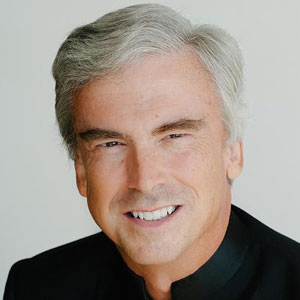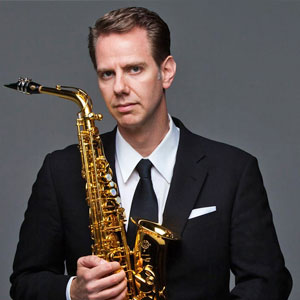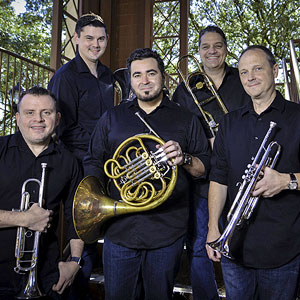TRIATHLON
Tuesday, February 6, 2024, 7:30pm
Meyerson Symphony Center + Livestream
Jerry Junkin, Artistic Director & Conductor

In his 30th season as Artistic Director and Conductor of the Dallas Winds, Jerry Junkin is recognized as one of the world’s most highly regarded wind conductors. He has served as Music Director and Conductor of the Hong Kong Wind Philharmonia since 2003, and Principal Guest Conductor of the Senzoku Gakuen College of Music Wind Symphony in Tokyo since 2007. Additionally, 2021-2022 marks his 34th year on the faculty of The University of Texas at Austin, where he holds the Vincent R. and Jane D. DiNino Chair for the Director of Bands. There, he also holds the title of University Distinguished Teaching Professor. Previously, he served on the faculties of both the University of Michigan and the University of South Florida. In addition to his responsibilities as Professor of Music and Conductor of the Texas Wind Ensemble, he serves as Head of the Division of Conducting and Ensembles and teaches courses in conducting and wind band literature. He is a recipient of multiple teaching awards, and students of Mr. Junkin hold major positions throughout the world.
Performances under the direction of Mr. Junkin have won the praise of such notable musicians as John Corigliano, David Del Tredici, Gunther Schuller, Karel Husa, William Kraft, Jacob Druckman and Michael Colgrass, among many others. Mr. Junkin has released over 30 compact disc recordings for the Reference, Klavier and Naxos labels. The New York Times named his release on the Reference Recordings label, Bells for Stokowski, one of the best classical CD’s of the year. His performance of Circus Maximus with The University of Texas Wind Ensemble was released on the world’s first Blu Ray audio disc in 5.1 surround sound by Naxos and was nominated for a GRAMMY. During the summer of 2014, he led The University of Texas Wind Ensemble on a four week tour around the world.
Mr. Junkin is an enthusiastic advocate of public school music education, having conducted All-State bands and festivals in forty-eight states and on five continents. He spends his summers in residence at the Interlochen Arts Camp in Michigan, as well as appearing at major music festivals throughout the world.
Mr. Junkin has served as President of the Big XII Band Director’s Association and is a member of the Board of Directors of The John Philip Sousa Foundation, is Past-President of the American Bandmasters Association, and is Past President of the College Band Directors National Association. Regularly making guest appearances with ensembles such as the Tokyo Kosei Wind Orchestra and the Taipei Symphonic Winds, he continues to conduct throughout the United States in addition to multiple appearances in Japan, China, and Europe. In 2005, he was presented the Grainger Medallion by the International Percy Grainger Society in recognition of his championing of Grainger’s works, and he has received numerous career awards from Kappa Kappa Psi, Phi Beta Mu, and the Midwest Clinic, among others. Mr. Junkin is a Yamaha Master Educator.
Timothy McAllister, saxophone

Soprano chair of the renowned PRISM Quartet and one of the world’s most celebrated classical saxophonists, TIMOTHY McALLISTER has been hailed as “a virtuoso” (The New York Times), an “exemplary soloist” (Gramophone Magazine), and “a titan of contemporary music and the instrument, in general” (The Cleveland Plain Dealer). Since his concerto debut at age sixteen with the Houston Civic Symphony, his career has taken him to over 20 countries, with solo performances in many of the world’s most prestigious venues including Prince Royal Albert Hall in London, the Sydney Opera House, Carnegie Hall and Amsterdam’s Concertgebouw. Mark Stryker of the Detroit Free Press recognized his over 50 albums as the top classical saxophone recordings in the industry, and he has been featured on three GRAMMY-winning albums.
McAllister has premiered over 250 new works by today’s most eminent and emerging composers. In October 2009, he appeared as saxophonist with the Los Angeles Philharmonic for Gustavo Dudamel’s Inaugural Gala concert performing the World Premiere of Pulitzer Prize and GRAMMY Award-winning composer John Adams’ major work, City Noir (released on DVD by Deutsche Grammophon), and performed the work with the orchestra throughout its 2010 U.S. Tour, culminating in an appearance in New York City’s Lincoln Center. In March 2015, he reprised his City Noir role with the LAPhil and Dudamel for an acclaimed Asian Tour, including concerts in Hong Kong, Beijing, Seoul and Tokyo. He reunited with Dudamel in June 2017 for a performance of the work with the legendary Berlin Philharmonic, which currently appears on the orchestra’s acclaimed Digital Concert Hall and was recorded for the 2019 GRAMMY-Nominated “John Adams Edition” Anthology. MORE >>>
Boston Brass

Since 1986 Boston Brass has set out to establish a one-of-a-kind musical experience, featuring colorful classical arrangements, burning jazz standards, and the best of original brass repertoire. Boston Brass treats audiences to a unique brand of musical entertainment that bridges the ocean of classical formality to delight regular concertgoers and newcomers alike with great music and boisterous fun. The quintet has played to audiences in all 50 U.S. states, and over 30 countries. Though the band regularly concertizes as a quintet, Boston Brass also performs with orchestras, concert and marching bands, organists, and jazz bands, and regularly collaborates with composers to create new works for the brass canon.
Music education is at the core of Boston Brass’s identity, and the quintet continues to conduct sessions around the world, including masterclasses and residencies at such prestigious institutions as the Eastman School of Music, The Juilliard School, the Royal Academy of Music in London, and Yong Siew Toh Conservatory in Singapore. In conjunction with the Yamaha Corporation, the quintet engaged in a 2018 tour of major Chinese music conservatories, and in 2021 the members of Boston Brass were appointed to the International Artist Advisory Council to the College of Music at Mahidol University in Thailand. The Boston Brass have been featured as educators and performers at the Midwest Band and Orchestra Clinic, World Association for Symphonic Bands and Ensembles, the American Bandmaster Association Conference, American Band College, Western International Band Clinic, and at innumerable state music education conferences. After a long hiatus, 2022 finally saw the return of the Boston Brass Summer Intensive in its new home at North Dakota State University’s Challey School of Music.
Fanfare
7:15pm, Meyerson lobby
Lest We Forget
Tyler Arcari
Dallas Winds Brass & Percussion
Jeremy Kondrat, conductor
Program
Flight to Neverland from “Hook” [4’40”]
John Williams, arr. Paul Lavender
Princess Leia’s Theme from “Star Wars” [4’49”]
John Williams, arr. Donald Hunsberger
TRIATHLON [30’57”]
John Corigliano
1. Leaps
2. Lines
3. Licks
Timothy McAllister
Soprano, alto, and baritone saxophones
— INTERMISSION —
La Boda de Luis Alonzo [6’30”]
Gerónimo Giménez, tr. Clark McAlister & Lowell Graham
Sounds of Cinema [10’38”]
Rick DeJonge
Boston Brass, soloists
City of Light, from “Five Cities” [2’07”]
Jorge Machain
Boston Brass, soloists
Adventures on Earth, from “E.T. the Extra-Terrestrial” [10’40”]
John Williams, arr. Paul Lavender
Dallas Winds Personnel
PICCOLO
Margaret Shin Fischer
FLUTE
Abby Easterling, principal
Kathy Johnson
OBOE
Clara Blood, principal
Ashley Howe
ENGLISH HORN
Aryn Mitchell
E♭ CLARINET
Brendan Fairleigh
B♭ CLARINET
Deborah Fabian, concertmaster
Sharon Deuby, associate principal
Mary Druhan
Ricky Reeves
Jeanie Murrow
Andre Canabou
Evan Schnurr
Kristen Thompson
Brendan Fairleigh
BASS CLARINET
Mickey Owens
Donald Fabian
CONTRA CLARINET
Robin Owens
BASSOON
Marty Spake, principal
Spencer Wilson
CONTRABASSOON
Kevin Grainger
SOPRANO SAXOPHONE
Donald Fabian
ALTO SAXOPHONE
Donald Fabian, principal
David Lovrien
TENOR SAXOPHONE
Roy E. Allen, Jr.
BARITONE SAXOPHONE
John Sweeden
HORN
Joseph Charlton, principal
Eric Hessel
Derek J. Wright
Timothy Stevens
Benjamin Ruiz
TRUMPET
Tim Andersen, co-principal
James Sims, co-principal
Richard Adams
Daniel Kelly
Tyler Moore
Shaun Abraham
Jared Broussard
TROMBONE
Jacob Muzquiz, principal
James McNair
BASS TROMBONE
Barney McCollum
EUPHONIUM
Grant Jameson, principal
Donald Bruce
TUBA
Jason Wallace, principal
Nick Beltchev
STRING BASS
Andrew Goins
Benjamin Mitchell
PIANO
Cameron Hofmann
HARP
Naoko Nakamura
TIMPANI
Jacob Hord
PERCUSSION
Roland Muzquiz, principal
Steve McDonald
Jon Lee
Nate Collins
Jose Uzcategui
Kirstyn Norris
Staff
Gigi Sherrell Norwood – Personnel Manager
Chrystal Stevens – Music Librarian
Ramon Muzquiz – Technical Director
Kim Campbell – Founder/Executive Director
Grace Lovrien – Executive Assistant
Gigi Sherrell Norwood – Director of Concert Operations
Todd Toney – Director of Education
Lenore Ladwig Scott – Bookkeeper
Livestream
George Gilliam – Audio Engineer
Christopher Cook – Remote Cameras
Cameron Conyer – Technical Engineer
Adam Ellard – Director
Savannah Ekrut – Switcher, Camera
Lydia Amstutz – Titles, Camera
Todd Toney – Score Reader
David Lovrien – Title Design
Program Notes
TRIATHLON
Although the title of this concerto seems obvious now, I thought of it long after the work was completed. My original goal was to write a three-movement work each featuring one member of the saxophone family.
The virtuosic possibilities of the soprano sax – rivalling that of the clarinet – inspired a first movement entitled “Leaps” that, as the title implies, is buoyant, acrobatic, and optimistic. An orchestral introduction of jumping woodwinds and a long-lined melody lead to the entrance of the soloist who, after a few virtuosic turns, sings the melody introduced by the orchestra. This melody utilizes the entire lyrical range of the soprano saxophone and leads to a slower section that extends and develops the melody. But the joyous opening returns and the movement ends as it began – with a leap.
The second movement features the alto saxophone, and is entitled “Lines”. Lines, in music, describe the horizontal motion of notes, or, as we know it, melody. And, indeed, this entire movement is totally melodic and serene. The only dynamic climax in it is one of intensity, but it too is composed of purely melodic material.
I have always loved the sassy, gravelly sound of the baritone sax, so it had to lead the last movement of my concerto. “Licks” is a jazz term, and means small improvisational moments in a piece. While this is not a jazz movement, the idea of small ornamental turns appealed to me, and provided me with the inspiration for the solo writing.
The movement starts with an unaccompanied cadenza. In it, the soloist explores many of the remarkable unusual sounds that the saxophone family can produce. At the beginning we hear soft key clicks, which are done without breathing into the instrument. This soon develops into a technique called “slap tonguing” in which the performer literally slaps his tongue against the reed. It is a totally delightful and rude sound, and both these devices alternate in the body of the cadenza.
After the saxophone plays a giant harmonic glissando, the orchestra enters with a soaring dramatic theme totally at odds with the soloist’s strange sounds. The soloist then enters, playing material with slap-tongue technique, which the orchestra constantly interrupts. Finally, the soloist joins the orchestra in some highly ornamented licks, and the movement barrels forward. The soloist, playing in perpetual motion and in extreme registers, leads us to a central dialogue between him and the woodwinds. The dramatic material returns, building to a climax at which the soloist retrieves his soprano saxophone, and leads the orchestra to its spirited conclusion.
I could not have written this work without the support of a couple whose help in commissioning composers is legendary. This concerto is dedicated to “Michèle and Larry Corash, with love and admiration, celebrating their 50th wedding anniversary”.
– John Corigliano
